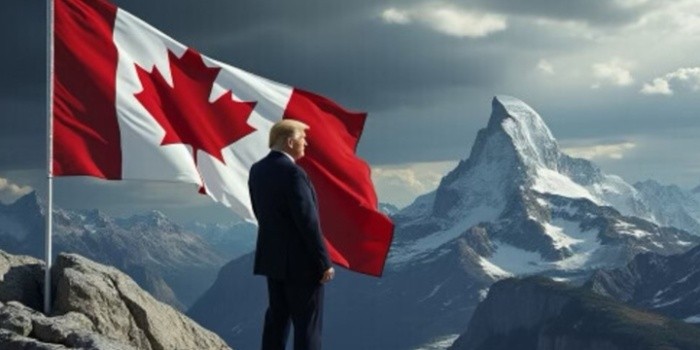(Headline USA) President Donald Trump said Sunday that Americans initially could feel “some pain” from the emerging trade war triggered by his tariffs against Canada, Mexico and China.
However, the end result will be to further bolster his “America First” agenda as domestic production fills the void of cheaply made imported products and the more secure borders ensure that American citizens reap the job benefits of American industry rather than cheaply imported workers.
He also warned outgoing Canadian Prime Minister Justin Trudeau and other members of the Liberal party in the U.S.A.’s northern neighbor that Canada would “cease to exist” without its trade surplus with the United States.
More than 75% of Canada’s exports go to the U.S. Canada is the largest export market for 36 states, and Mexico is the largest trading partner of the U.S.
Trump signed the trade orders, adding additional surgarges to imported goods, on Saturday at his Florida Mar-a-Lago estate. On Sunday night, he returned from Florida and threatened to impose steeper tariffs elsewhere, telling reporters that the import taxes will “definitely happen” with the European Union and possibly with the United Kingdom as well.
He brushed aside retaliatory measures from Canada, saying, “If they want to play the game, I don’t mind. We can play the game all they want.”
Trump said he planned to speak with his Canadian and Mexican counterparts on Monday.
Trump long touted the promise of tariffs on the campaign trail, although critics maintain that they will further compound the pain from the inflation that began during former President Joe Biden’s first year in office and has remained difficult to rein in, despite the highest interest rates in decades.
An analysis by the Budget Lab at Yale showed that if the tariffs were to continue, an average U.S. household would lose roughly $1,245 in income this year, in what would be the overall equivalent of a more than $1.4 trillion tax increase over the next 10 years.
Larry Summers, treasury secretary in the Clinton administration, told CNN on Sunday that the ultimate winner would be Chinese leader Xi Jinping because “we’ve moved to drive some of our closest allies into his arms” and “we’re legitimating everything he’s doing by violating all the international norms that we set up.”
Trump seemed to acknowledge an initial increase in the cost of living for goods on which America typically depends on foreign trade partners. However, unlike inflation, tariffs should also increase the value of the dollar in the long run—assuming there are also reductions to government spending and minting of money.
“WILL THERE BE SOME PAIN? YES, MAYBE (AND MAYBE NOT!),” the Republican president said in a social media post. “BUT WE WILL MAKE AMERICA GREAT AGAIN, AND IT WILL ALL BE WORTH THE PRICE THAT MUST BE PAID.”
His administration has not said what specific improvements would need to be seen in stopping illegal immigration and the smuggling of fentanyl to merit the removal of the tariffs that Trump imposed under the legal justification of an economic emergency. But Trump, speaking to reporters after Air Force One, landed said that the trade imbalances with Canada and Mexico would also need to be erased as a condition for lifting the tariffs.
The president also tried to clarify his post about the possible inflation, saying on Sunday: “We may have in the short term, a little pain, and people understand that. But long term, the United States has been ripped off by virtually every country in the world.”
The tariffs are set to launch Tuesday and triggered confusion as Canada’s U.S. ambassador, Kirsten Hillman, told ABC News that her country was perplexed by the move because “we view ourselves as your neighbor, your closest friend, your ally.”
In his Truth Social post, Trump took particular aim at Canada, which responded with retaliatory measures. Trump is placing a 25% tariff on Canadian goods, with a 10% tax on oil, natural gas and electricity. Canada is imposing 25% tariffs, more than $155 billion Canadian (US$105 billion), on U.S. products, including alcohol and fruit.
One area in particular that Trump hopes to bolster U.S. production is in the energy sector. Under the Biden administration, one-quarter of the oil that America consumed per day came from Canada.
Trump contended that without that surplus, “Canada ceases to exist as a viable Country. Harsh but true! Therefore, Canada should become our Cherished 51st State. Much lower taxes, and far better military protection for the people of Canada — AND NO TARIFFS!”
Trudeau—who will be stepping down in a matter of weeks as his party faced the prospect of a conservative revolution like the one that America saw in November—encouraged Canadians to buy more Canadian goods, saying Trump’s moves would only cause pain across North America.
Canada will first target alcohol, cosmetics and paper products; a second round later will include passenger vehicles, trucks, steel and aluminum products, certain fruits and vegetables, beef, pork, dairy products and more.
Mexico’s president, Claudia Sheinbaum, also announced new tariffs and suggested the U.S. should do more within its own borders to address drug addiction. She and Trudeau spoke after Trump’s announcement and agreed “to enhance the strong bilateral relations” between Canada and Mexico, according to the prime minister’s office.
The Chinese government said it would take steps to defend its economic interests and intends to file a lawsuit with the World Trade Organization.
The U.S. president did not offer details Sunday about when he would impose tariffs elsewhere, but he said they would be coming “pretty soon” for the EU.
Goldman Sachs, in a Sunday analyst note, stressed that the tariffs go into effect on Tuesday, which means they’re likely to proceed “though a last-minute compromise cannot be completely ruled out.”
The investment bank concluded that because of the possible economic damage and possible conditions for removal “we think it is more likely that the tariffs will be temporary but the outlook is unclear.”
Adapted from reporting by the Associated Press

